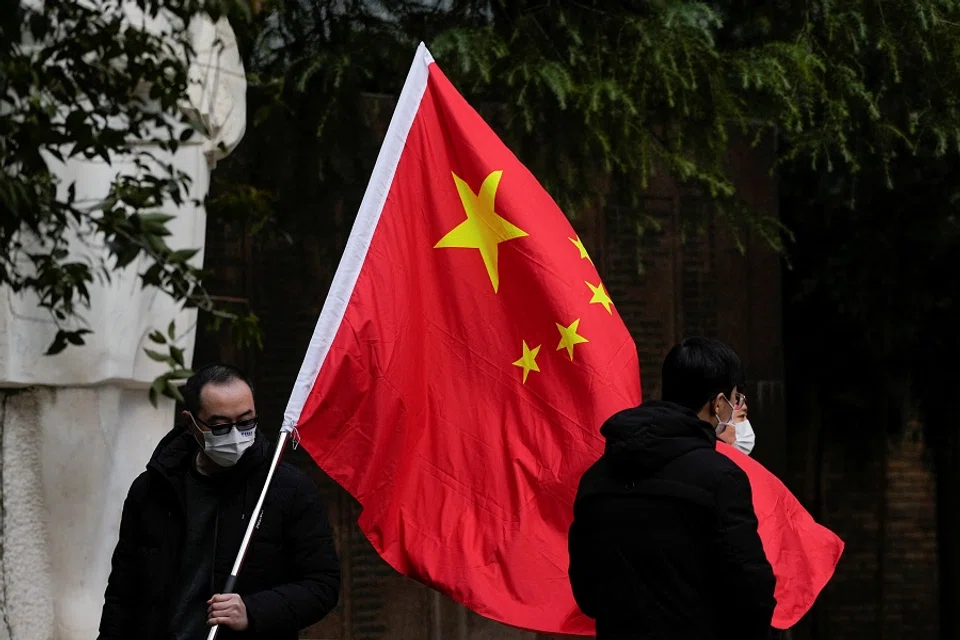US allies want good relations with China too
US academic Zhu Zhiqun notes that the US is still trying to exert pressure on its allies to follow its moves to suppress China. However, China is the largest trading partner of over 120 countries. These countries will never forsake their cooperation with China to accommodate the US. In fact, the trend of countries actively developing economic and trade relations with China while maintaining a security partnership with the US looks set to stay.

Chinese President Xi Jinping's recent visit to Saudi Arabia, a US ally, has sparked debate about whether third parties should choose sides amid China-US rivalry. As China and the US are influential world powers, China-US competition affects the world, none more so than Asia-Pacific countries and US allies - the former are in the region that is the main battleground of China-US competition, and the latter's diplomatic stance and allegiance to the US may be called into question.
Should third parties choose sides as competition between the US and China intensifies? This is a question that has troubled many countries. In fact, choosing sides is like putting all your eggs in one basket, which is unwise, and not many countries actually choose sides. Perhaps apart from Japan, few of the US's key allies are dancing to its tune or as committed to containing China as the US. For most countries, getting involved in China-US competition is of no benefit at all. It is best not to choose sides and to lie low.
Pressuring allies to take sides
In Southeast Asia, Singapore is rather outspoken and has often told the US and China that it and other Southeast Asian countries do not want to be forced to choose sides. It is admirable that Singapore is able to manoeuvre between China and the US. Interestingly, the Biden administration said as much itself that the US does not force countries to choose sides.
Although Xi's latest visit to Saudi Arabia has them worried that China's influence in the Middle East will increase, there is nothing much the US can do. National Security Council coordinator for strategic communications John Kirby said that Saudi Arabia has the right to conduct bilateral relations as it sees fit as a sovereign nation and that the US is not asking nations to choose sides.
... while the US does not seem to be forcing countries to choose sides, it is actually directly or indirectly pressuring its allies to confront China.

From George W. Bush to Donald Trump, there has been a precedent of the US government asking other countries to choose sides. After the September 11 attacks, Bush threatened: "You're either with us or against us." Perhaps this was understandable given the unique circumstances at the time. When Trump became US president, the US government wanted other countries to join its trade and tech wars against China or risk having their intelligence sharing, military cooperation and economic aid reduced or even terminated.
Under the current Biden administration, while the US does not seem to be forcing countries to choose sides, it is actually directly or indirectly pressuring its allies to confront China. This has put some of its allies in a difficult position, as is the case with Israel.
Linking national security with the economy
The US also tends to elevate regular investments and bilateral cooperation to the level of national security. According to Professor Yoram Evron of the University of Haifa in Israel, back when a new terminal was to be built in the Haifa port, Haifa first contacted the US embassy to help find an American company to build the terminal. This was giving the US the right of first refusal and showing them much respect.
However, a few months passed with no reply from the US. The city of Haifa subsequently decided to put out an international call for tender, which China's Shanghai International Port Group (SIPG) won in 2015. Construction was officially launched in 2018, and the SIPG was awarded a 25-year concession to run the port. Both the Trump and Biden administrations have warned Israel against letting a Chinese enterprise manage the new terminal, and even made a request to Israel to allow the US Coast Guard to inspect the Haifa port, to which the latter declined.
Today's world is no longer a unipolar one dominated by the US.

The US's main argument is that the new Haifa terminal is situated too close to where the US Navy's 6th Fleet is docked. This makes it too convenient for China to spy on US-Israel military intelligence. My Israeli friends jokingly asked if China would be so stupid as to spend such a huge sum of money on such a big project just to engage in espionage activities. Can't they just rent a place near the port?
On 1 September 2021, the nearly US$2 billion Bay Port at Haifa, which will be operated by SIPG, was inaugurated and could be considered a case of a US ally successfully resisting US pressure.
US allies seek good relations with China too
Today's world is no longer a unipolar one dominated by the US. The US is not yet used to or willing to face this reality, but most countries including its allies are aware of this fact.
Recently, Germany and the Netherlands have questioned the US's China policy. German Chancellor Olaf Scholz warned the West not to isolate China and split the world into confrontational blocs again. On the issue of high-tech exports, Dutch Foreign Trade Minister Liesje Schreinemacher said that the US should not dictate another country's approach to China exports. But in the end, the Netherlands failed to withstand US pressure and joined the US and Japan in tightening export controls over chips to China. However, Dutch Prime Minister Mark Rutte met Xi in Bali in November, and could visit China next year at Xi's invitation. Clearly, the Netherlands is willing to maintain and develop bilateral relations with China.
Indeed, most countries hope to maintain good relations with both China and the US because this aligns with their national interests.

Indeed, most countries hope to maintain good relations with both China and the US because this aligns with their national interests. China is the largest trading partner of over 120 countries, and these countries will never forsake their cooperation with China to accommodate the US. In most cases, these countries are actively developing economic and trade relations with China while maintaining security partnerships with the US, creating a new two-pronged international politics and economic landscape that looks here to stay.
In today's multipolar world, many countries hope to have more opportunities to make more friends in their foreign relations. Most countries do not want to choose between China and the US, and also hope that both powers can coexist peacefully to benefit the world.
Of course, if third parties are able to play an active role in mitigating tensions between China and the US such that the latter two can compete healthily, be more tolerant and cooperative, jointly safeguard international order, and avoid conflicts and a new Cold War, that would make the world a better place.
This article was first published in Lianhe Zaobao as "中美竞争与第三方的选择".
Related: Xi's Saudi visit: Middle powers uniting in a hierarchical world | China-US competition: Why small countries will not choose sides | Washington threatening Portugal to choose between China and the US? | When a country needs to choose between realism and idealism | Small nations' survival strategy for a world in flux: Lessons from Rwanda and Timor-Leste | [State of our world] Is the world really heading into disorder?





![[Photos] Fact versus fiction: The portrayal of WWII anti-Japanese martyrs in Taiwan](https://cassette.sphdigital.com.sg/image/thinkchina/3494f8bd481870f7c65b881fd21a3fd733f573f23232376e39c532a2c7593cbc)